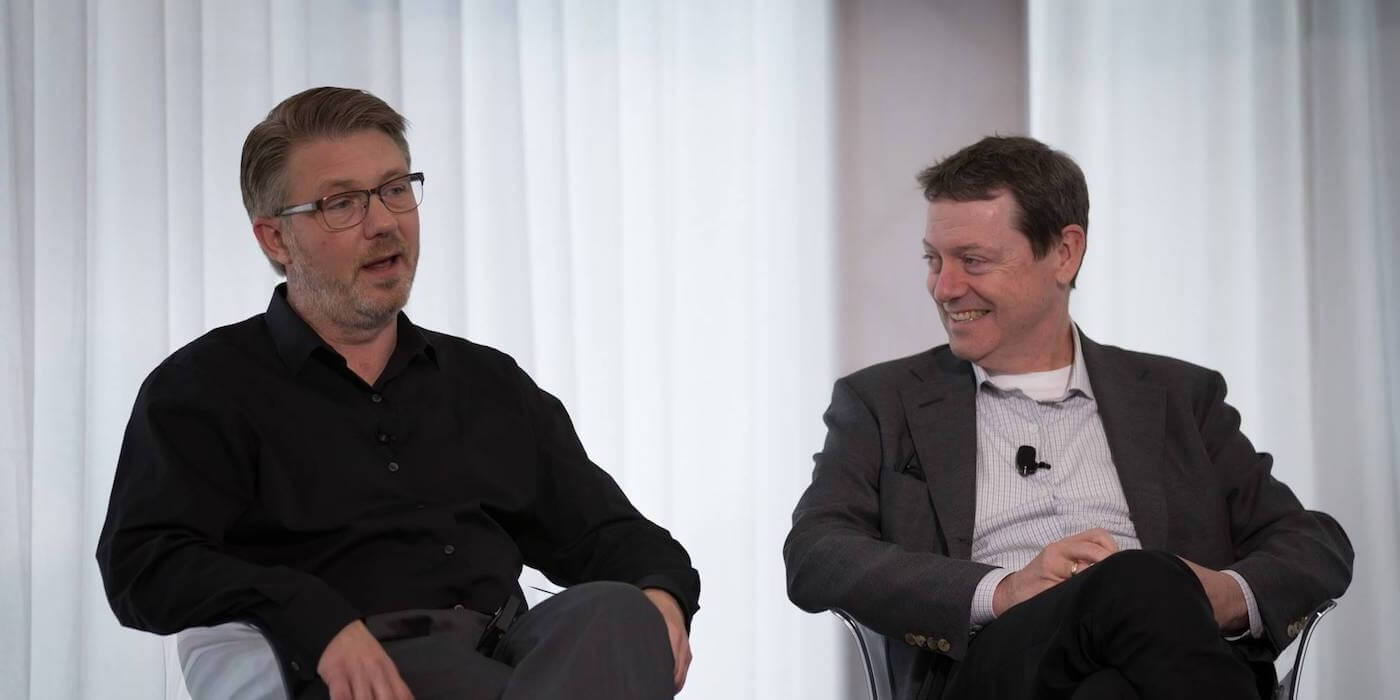
Big, established companies can be innovative — they just have to want it, according to top venture capitalist Fred Wilson, a partner at Union Square Ventures. At a time when enterprises are racing to the cloud, connecting everything to the internet, and exploring the possibilities of burgeoning machine intelligence, that’s some welcome news.
Speaking during a panel at the recent WorkMarket Exchange in New York City, Wilson and WorkMarket CEO Stephen DeWitt talked with NY1’s Pat Kiernan about the changes businesses are faced with, and some of the barriers to going full steam ahead toward transformation.
The courage to make the leap
DeWitt shared that he believes many leaders are simply afraid to step away from the tried-and-true business practices that have been successful in the past. Cloud migration, IoT, and artificial intelligence all represent the unknown to businesses.
Sure, cloud and AI sound like the future, but actually investing in these new technologies has given some leaders pause. Even scarier is fundamentally shaking up business operations to take full advantage of the new possibilities technology has presented us with. Naturally, it’s easier to think about standing still than pushing forward into the unknown.

However, one of the biggest takeaways from WorkMarket Exchange is that what worked in the past will no longer cut it in the digital age. Consumers expect more, and competitors are leveraging the power of the cloud to boost productivity, quality, and efficiency.
Despite some of the alarm surrounding artificial intelligence taking over the world, Wilson predicted that AI will help automate the mundane, and might even help humans be more creative. Importantly, Stephen added that AI will boost quality of a business by empowering workers to do things better.
In short, technology isn’t here to steal jobs and confuse business leaders. The best new enterprise tech actually makes everything simple, automated, and scalable in the cloud so it’s easier for businesses to get work done.
“Blowing things up”
At WorkMarket Exchange, one of the most critical pieces of advice offered by Fred Wilson was for leaders to stop running their business on spreadsheets. He explained that the more businesses take things out of spreadsheets and automate them, they will have more clarity about what’s really going on within their business.
Automated solutions like WorkMarket help offer visibility and insights across an organization that would be near impossible to glean from a mess of disparate spreadsheets. That visibility and unified data can help drive insights that will give business leaders confidence in their evolving operations.
“Blowing things up,” and doing things in a completely new way, is very revealing to big organizations, Wilson advised. He added that it not only helps organizations reach the full potential of new technology, but it also delivers important clarity on where a business is actually spending money.
So will the breakneck pace of current technology innovation finally slow down and allow business leaders to catch up? Not likely, said Wilson — instead, he expects the pace of change to accelerate. He added that we as humans simply have to continue adapting to the changes technology presents us with.
Change is always scary. But the companies that are the best at adapting to change, and aren’t afraid to “blow things up” to arrive at their agile organization, will be well positioned for whatever the future holds.
For more expert insight on the future of work, check out the video of Fred Wilson and WorkMarket’s Stephen DeWitt chatting with NY1’s Pat Kiernan.
Big, established companies can be innovative — they just have to want it, according to top venture capitalist Fred Wilson, a partner at Union Square Ventures. At a time when enterprises are racing to the cloud, connecting everything to the internet, and exploring the possibilities of burgeoning machine intelligence, that’s some welcome news.
Speaking during a panel at the recent WorkMarket Exchange in New York City, Wilson and WorkMarket CEO Stephen DeWitt talked with NY1’s Pat Kiernan about the changes businesses are faced with, and some of the barriers to going full steam ahead toward transformation.
The courage to make the leap
DeWitt shared that he believes many leaders are simply afraid to step away from the tried-and-true business practices that have been successful in the past. Cloud migration, IoT, and artificial intelligence all represent the unknown to businesses.
Sure, cloud and AI sound like the future, but actually investing in these new technologies has given some leaders pause. Even scarier is fundamentally shaking up business operations to take full advantage of the new possibilities technology has presented us with. Naturally, it’s easier to think about standing still than pushing forward into the unknown.
However, one of the biggest takeaways from WorkMarket Exchange is that what worked in the past will no longer cut it in the digital age. Consumers expect more, and competitors are leveraging the power of the cloud to boost productivity, quality, and efficiency.

Despite some of the alarm surrounding artificial intelligence taking over the world, Wilson predicted that AI will help automate the mundane, and might even help humans be more creative. Importantly, Stephen added that AI will boost quality of a business by empowering workers to do things better.
In short, technology isn’t here to steal jobs and confuse business leaders. The best new enterprise tech actually makes everything simple, automated, and scalable in the cloud so it’s easier for businesses to get work done.
“Blowing things up”
At WorkMarket Exchange, one of the most critical pieces of advice offered by Fred Wilson was for leaders to stop running their business on spreadsheets. He explained that the more businesses take things out of spreadsheets and automate them, they will have more clarity about what’s really going on within their business.
Automated solutions like WorkMarket help offer visibility and insights across an organization that would be near impossible to glean from a mess of disparate spreadsheets. That visibility and unified data can help drive insights that will give business leaders confidence in their evolving operations.
“Blowing things up,” and doing things in a completely new way, is very revealing to big organizations, Wilson advised. He added that it not only helps organizations reach the full potential of new technology, but it also delivers important clarity on where a business is actually spending money.
So will the breakneck pace of current technology innovation finally slow down and allow business leaders to catch up? Not likely, said Wilson — instead, he expects the pace of change to accelerate. He added that we as humans simply have to continue adapting to the changes technology presents us with.
Change is always scary. But the companies that are the best at adapting to change, and aren’t afraid to “blow things up” to arrive at their agile organization, will be well positioned for whatever the future holds.
For more expert insight on the future of work, check out the video of Fred Wilson and WorkMarket’s Stephen DeWitt chatting with NY1’s Pat Kiernan.




